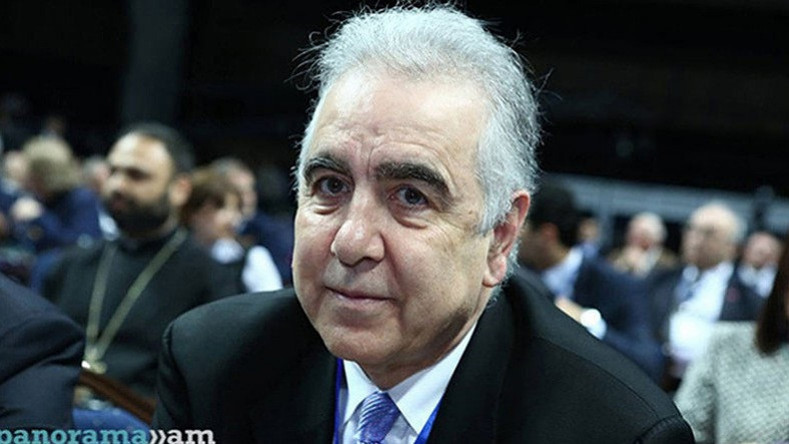
Parliamentary Assembly of Council of Europe voted 76-10 to kick Azerbaijan out
By Harut Sassounian
Publisher, The California Courier
With each passing day, the noose is tightening around Pres. Ilham Aliyev's neck. The European Union’s Chief of Foreign Policy Josep Borrell warned Azerbaijan on January 22 that there would be ‘severe consequences’ if Armenia’s territory were to be violated. The French Senate adopted a resolution by a vote of 336 to 1 on January 17 supporting Armenia's territorial integrity and calling for sanctions against Azerbaijan. On January 18, Russia’s Foreign Minister Sergey Lavrov publicly contradicted Aliyev’s repeated demands that Armenia provide Azerbaijan a ‘Corridor’ through ‘Zangezur.’ Lavrov said that there is no mention of ‘Zangezur Corridor’ in the Nov. 10, 2020 agreement signed by the leaders of Armenia, Azerbaijan and Russia.
The latest blow to Azerbaijan was delivered last week by the Parliamentary Assembly of the Council of Europe (PACE) which voted overwhelmingly to reject the credentials of Azerbaijan’s delegates, thus ejecting Baku’s participation in its meetings for at least one year. By a vote of 76 to 10, with four abstentions, PACE delegates decided to expel Azerbaijan on January 24, 2024.
The resolution adopted by PACE stated: “Very serious concerns remain as to [Azerbaijan’s] ability to conduct free and fair elections, the separation of powers, the weakness of its legislature vis-à-vis the executive, the independence of the judiciary and respect for human rights, as illustrated by numerous judgments of the European Court of Human Rights and opinions of the European Commission for Democracy through Law (Venice Commission).” PACE recalled its previous resolutions which had referred to multiple problems with Azerbaijan, including the functioning of democratic institutions, organized crime, corruption, and money laundering, political prisoners, restrictions on NGO activities, violations of the rights of LGBTI people, non-implementation of judgments of the European Court of Human Rights, transnational repression as a growing threat to the rule of law and human rights, Pegasus and similar spyware and secret state surveillance, and the cases of at least 18 Azeri journalists and media actors who are currently in detention. PACE concluded that “more than 20 years after joining the Council of Europe, Azerbaijan has not fulfilled [its] major commitments.”
Referring to Artsakh, PACE mentioned its 2023 report which had specified that Azerbaijan “did not acknowledge the very serious humanitarian and human rights consequences stemming from … the absence of free and safe access through the Lachin Corridor … which lasted for nearly 10 months.” PACE also condemned “the Azerbaijan army’s military operations of September 2023, which led to the flight of the entire Armenian population of Nagorno-Karabakh to Armenia and to allegations of ‘ethnic cleansing.’”
PACE expressed its concern about Azerbaijan’s lack of cooperation with the “rapporteurs of the Monitoring Committee [who] were not allowed to meet with persons detained allegedly on politically motivated charges.” PACE was also not invited “to observe the forthcoming presidential election despite Azerbaijan’s obligation to send such an invitation as the country is under monitoring procedure.” Furthermore, Azerbaijan had refused three times the visit of a PACE rapporteur.
Ignoring Azerbaijan’s multiple violations of its commitments to the Council of Europe, Azerbaijan’s Foreign Minister Jeyhun Bayramov condemned PACE’s decision. However, he acknowledged that Azerbaijan was ejected because of its invasion of Artsakh, which he described as “restoration by Azerbaijan of its sovereignty.”
Even though Azerbaijan had dismissed all of its violations of international law, including the numerous judgments of the European Court of Human Rights and rulings of the International Court of Justice, this time around, Baku reacted extremely negatively. The Azeri delegation in PACE announced that their country has decided to “cease its engagement with and presence at PACE until further notice.” Some have compared Azerbaijan’s withdrawal from PACE after its ejection to Nazi Germany leaving the League of Nations in 1933.
PACE’s vote was overwhelmingly against Azerbaijan because only nine Turkish delegates and one Albanian delegate voted in favor of Azerbaijan. One of the Turkish delegates even voted against Azerbaijan. Meanwhile, 76 delegates from 28 countries, including all four Armenian delegates, voted to eject Azerbaijan.
Azerbaijan’s loss at PACE is Armenia’s gain:
1) Azerbaijan’s reputation was further tarnished after its ejection from PACE, exposing its numerous human rights violations and flagrant disregard for European values.
2) Baku is now deprived of the opportunity to raise its issues in Europe through PACE.
3) Azerbaijan will no longer be able to criticize Armenia during PACE meetings.
4) Azerbaijan will be unable to vote in favor of its interests and against those of Armenia at PACE meetings.
For far too long, Azerbaijan has been spoiled by the international community, particularly Western countries, blinded by Baku’s vast oil and gas supplies. After its ejection from PACE, Azerbaijan should now be expelled from the Council of Europe.
Related news
Newsfeed
Videos






























